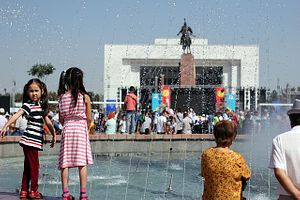After a few difficult years in which the economies of Central Asia were pulled down by the oil crash and the Russian economy’s doldrums, either directly or indirectly, recovery seems to be dawning. Kyrgyzstan, which has had tumultuous growth — cratering in 2012 at -0.1 percent, soaring in 2013 to 10.9 percent and falling to an estimated 2.2. percent in 2016 — looks set for continued recovery. The World Bank projected in January that Kyrgyz GDP growth would move up to 3 percent this year and could reach 4.9 percent by 2019.
The IMF is also optimistic, though perhaps cautiously so as recovery is contingent on government-led reform efforts. An IMF team recently visited Bishkek to conduct a review and various meetings. The team’s concluding statement, released immediately following the visit this month, says “[t]he prospects of a recovery following the recent crisis are improving with good indicators across the region, but without additional effort to shore up economic stability and structural reforms growth could fall short of aspirations.” The IMF statement also noted that “continuing the fight against corruption [is] key to unleashing private sector-led growth.”
With these numbers and recommendations in mind, what do Kyrgyz think?
A recent public opinion survey, conducted by Baltic Surveys/The Gallup Organization on behalf of the International Republican Institute (IRI), indicates that the majority of Kyrgyz think the country is headed in the right direction.
The Kyrgyz political arena may be roiling, with a handful of politicians arrested in recent months and occasional protests, but 65 percent of those surveyed said the country was moving in the right direction. This may not, however, be the best measure of stability. The same survey question in May 2009 — a year before the country’s second revolution — indicated that 63 percent of Kyrgyz thought the country was moving in the right direction. The following year it plummeted to 28 percent.
When asked how the country’s economic situation had changed in the past year, 39 percent said it had improved somewhat and 37 percent said it had stayed the same. Taken to the household level, 35 percent said their financial situation had somewhat improved and 43 percent said it had stayed the same, a marked improvement over 2016 in both categories. The percent saying their financial situation had “worsened a lot” dropped from 20 percent in 2016 to 13 percent earlier this year when the survey was conducted.
Unemployment and corruption feature prominently among the problems facing the country identified by those surveyed. Unemployment was identified as a top problem nationally, at the town/village level, and individually but while corruption was the second most common response (after unemployment) as a national problem, it barely appeared among the responses to the other two versions of the question.
This isn’t surprising. Unemployment is a problem that rides high in the Kyrgyz mind because it is immediately identifiable at the individual and community level and the link between employment and overall national economic health is obvious. Corruption, on the other hand, isn’t always as easily identified as a local problem. This may be in part because few like to admit that they themselves, or friends or relatives, are engaged in corruption, or they may not see lower level corruption as anything other than business as usual. Meanwhile big-C “Corruption” makes the news nationally. The effects of corruption, however, are still evident in the responses given for town/village problems.
The top three responses to the question “What are the most important problems your town/village is facing at the moment?” were “poor roads and streets,” “lack of drinking water,” and “unemployment.”
The most recent former Kyrgyz prime minister, Temir Sariyev, was hounded from office last year by allegations of corruption relating to contracts for a road project. Indeed, construction projects are prime territory for all kinds of corrupt practices, which result in slow implementation of projects and bad quality roads. Corruption can also leech funds resulting in lower investment than intended, or otherwise direct development funds to politically meaningful communities, skipping others entirely.
When asked directly if corruption was a big problem, 78 percent responded that it was a “very big issue” and 17 percent that it was a “big issue.”
As Kyrgyzstan enters what the IMF referred to as a “nascent economic recovery” it will be vitally important for Bishkek to listen to the people and seriously address unemployment and corruption.
Note: The 84-page PowerPoint with results from IRI survey is well worth reading through in its entirely (and undoubtedly I’ll reference it again). There are deeply fascinating responses to questions on democracy and politics, as well as Kyrgyzstan’s international relations, which shed further light on how Kyrgyz view their country.

































